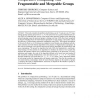Free Online Productivity Tools
i2Speak
i2Symbol
i2OCR
iTex2Img
iWeb2Print
iWeb2Shot
i2Type
iPdf2Split
iPdf2Merge
i2Bopomofo
i2Arabic
i2Style
i2Image
i2PDF
iLatex2Rtf
Sci2ools
120
click to vote
SIROCCO
2000
2000
Cooperative computing with fragmentable and mergeable groups
ABSTRACT: This work considers the problem of performing a set of N tasks on a set of P cooperating message-passing processors (P N). The processors use a group communication service (GCS) to coordinate their activity in the setting where dynamic changes in the underlying network topology cause the processor groups to change over time. GCSs have been recognized as effective building blocks for fault-tolerant applications in such settings. Our results explore the efficiency of fault-tolerant cooperative computation using GCSs. The original investigation of this area by Dolev et al. [8] focused on competitive lower bounds, non-redundant task allocation schemes and work-efficient algorithms in the presence of fragmentation regroupings. In this work we investigate work-efficient and message-efficient algorithms for fragmentation and merge regroupings. We present an algorithm that uses GCSs and implements a coordinatorbased strategy. For the analysis of our algorithm we introduce the notion...
Algorithm | Fault-tolerant Cooperative Computation | Non-redundant Task Allocation | SIROCCO 2000 | SIROCCO 2007 |
| Added | 01 Nov 2010 |
| Updated | 01 Nov 2010 |
| Type | Conference |
| Year | 2000 |
| Where | SIROCCO |
| Authors | Chryssis Georgiou, Alexander A. Shvartsman |
Comments (0)

